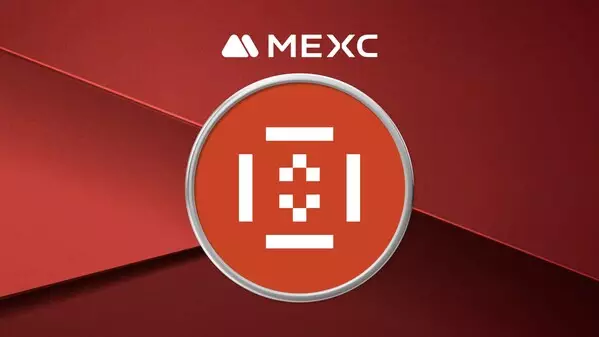VICTORIA, Seychelles, April 10, 2025 /PRNewswire/ -- MEXC, a leading global cryptocurrency exchange, is thrilled to announce the KernelDAO ($KERNEL) listing on April 14, 2025(UTC). This strategic addition reinforces MEXC's commitment to providing users with access to innovative and high-potential crypto projects.
KernelDAO is an advanced restaking protocol designed to enhance the security and utility of staked assets across the entire restaking stack. It powers three core product lines: Kernel — a foundational restaking layer supporting BTC, BNB, and yield-bearing assets; Kelp LRT — the second-largest liquid restaking solution on Ethereum; and Gain — an innovative reward farming vault integrating tokenized strategies across both crypto and real-world assets (RWAs). With a total value locked (TVL) exceeding $2 billion, KernelDAO is backed by industry leaders including Binance Labs, Laser Digital, SCB, Bankless Ventures, Hypersphere, DACM, and more.
$KERNEL is the governance and utility token that powers the KernelDAO ecosystem. Holders can stake $KERNEL to strengthen network security, participate in governance, and maximize returns through veKERNEL staking, liquidity incentives, and slashing protection.
To celebrate this new listing, MEXC is launching an exclusive Airdrop+ Event, featuring a total prize pool of 135,000 USDT. Below are the key details of the event:
Event Period: April 8, 2025, 7:00 – April 18, 2025, 10:00 (UTC)
Benefit 1: Deposit and share 60,000 USDT (New user exclusive)
Benefit 2: Spot Challenge — Trade to share 15,000 USDT (For all users)
Benefit 3: Futures Challenge — Trade to share 50,000 USDT in Futures bonus (For all users)
Benefit 4: Invite new users and share 10,000 USDT (For all users)
For full event details and participation rules, please visit here.
MEXC has established itself as an industry leader by consistently providing users with early access to promising crypto projects. In 2024, MEXC introduced 2,376 new tokens, with 1,716 initial listings. According to the latest TokenInsight report, from November 1, 2024, to February 15, 2025, MEXC led the industry with an impressive 461 spot listings. Additionally, during the bi-weekly periods, MEXC maintained a high listing frequency, consistently ranking among the top six exchanges and demonstrating its ability to capture market trends quickly. MEXC will continue to innovate and expand its offerings, providing users with the best opportunities in the ever-evolving crypto space.
About MEXC
Founded in 2018, MEXC is committed to being "Your Easiest Way to Crypto." Serving over 36 million users across 170+ countries, MEXC is known for its broad selection of trending tokens, everyday airdrop opportunities, and low trading fees. Our user-friendly platform is designed to support both new traders and experienced investors, offering secure and efficient access to digital assets. MEXC prioritizes simplicity and innovation, making crypto trading more accessible and rewarding.
MEXC Official Website| X | Telegram |How to Sign Up on MEXC
Risk Disclaimer:
The information provided in this article regarding cryptocurrencies does not constitute investment advice. Given the highly volatile nature of the cryptocurrency market, investors are encouraged to carefully assess market fluctuations, the fundamentals of projects, and potential financial risks before making any trading decisions.
** The press release content is from PR Newswire. Bastille Post is not involved in its creation. **

MEXC to List KernelDAO ($KERNEL) with a 135,000 USDT Prize Pool
HONG KONG, May 1, 2025 /PRNewswire/ -- An international consortium led by The Chinese University of Hong Kong (CUHK)'s Faculty of Medicine (CU Medicine) and the University of Calgary in Canada has conducted a global epidemiological study on Inflammatory Bowel Disease (IBD). It found that this chronic gut condition follows a four-stage epidemiological evolution across different regions of the world. Analysing data from more than 500 epidemiological studies across 80 regions in the past century, the team generated a machine-learning model for classification of stages which enables health-care systems to prepare for the growing burden on healthcare arising from the prevalence of IBD. Results of the study have been published in the leading scientific journal Nature.
Epidemiological model informs trend of IBD burden for the next 20 years
The Global IBD Visualization of Epidemiology Studies in the 21st Century (GIVES‑21) consortium, led by Professor Gilaad Kaplan of University of Calgary and Professor Siew Ng of CU Medicine, synthesised data from 522 population-based studies across 82 geographical regions over the past century. They observed differences in IBD incidence and prevalence across various geographical areas over the past century suggest that epidemiological patterns shift through time.
To further explore the trends and characterise the epidemiology of IBD independent of geography and time, researchers developed a machine-learning model that classifies regions by epidemiologic stage, maps spatiotemporal transitions across stages and models a theoretical prevalence stage for the next two decades. They also demonstrated a stage where IBD prevalence reaches equilibrium. (Please refer to Table 1 for details.)
Professor Gilaad Kaplan, Professor of Medicine at the Cumming School of Medicine, the University of Calgary, said: "Our analysis, drawing on a century's worth of historical epidemiologic data, enables health authorities to tailor interventions – whether clinical, policy driven or preventive."
Incidence rapidly rising in China and Malaysia while Japan and South Korea seeing an acceleration in prevalence
Study data showed epidemiological stages vary among regions in Asia. Japan and South Korea, which underwent rapid industrialisation in the latter half of the 20th century, have reported prevalence exceeding 0.1%, placing them on the brink of transitioning towards stage 3. In contrast, nations like China and Malaysia, which industrialised later, entered stage 2 more recently.
Dr Joyce Mak, Honorary Clinical Associate Professor in the Department of Medicine and Therapeutics at CU Medicine, said: "Today, we stand at a critical juncture as we address the alarming rise in IBD in newly industrialised countries such as China and Malaysia. This increase is not just a statistic; it represents the health and well-being of millions of people. As these nations embrace rapid industrialisation and urbanisation, we must prioritise public health initiatives, enhance awareness, and invest in research to understand underlying causes of this disease."
Professor Siew Ng, Croucher Professor in Medical Sciences at CU Medicine, Director of the Microbiota I-Center (MagIC) and New Cornerstone Investigator, said: "Our GIVES‑21 consortium is conducting epidemiologic surveillance studies in low- and middle-income countries, as the disease is evolving in these regions. We are seeing a paradigm shift of IBD accelerating in these regions and we will need to prepare our clinical infrastructure and personnel to manage this complex and costly disease. We are planning research to focus on preventive strategies targeting the gut microbiome, diet and environmental exposures to reduce disease incidence."
This study was supported by The Leona M. and Harry B. Helmsley Charitable Trust, the International Organization for the study of IBD (IOIBD), and contributions from over 30 international partners.
** The press release content is from PR Newswire. Bastille Post is not involved in its creation. **

A global study led by CUHK and the University of Calgary charts four-stage evolution of Inflammatory Bowel Disease




















































